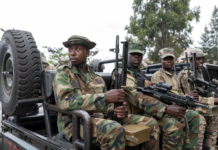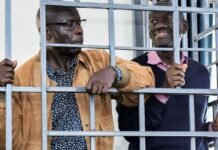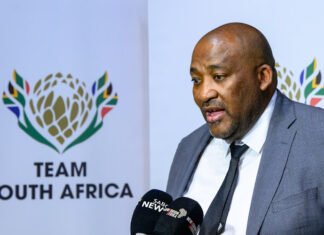For decades, Haiti has been plagued by the devastating impact of gang violence. However, the situation took a turn for the worse following the assassination of President Jovenel Moïse in July 2021.
As the Caribbean nation struggles to restore order, Kenya has stepped forward to lead a multinational security force in response to a plea from Haiti’s prime minister.
The decision by Kenya to provide assistance to Haiti highlights the importance of international cooperation in addressing global security challenges. With their experience in dealing with diverse security threats, Kenyan police officers have the potential to make a significant impact in curbing the gang crisis in Haiti.
Kenya has a long history of dealing with its own internal security issues, including terrorism and organized crime. The country’s police force has gained valuable expertise in combating these challenges, making them well-prepared to tackle similar issues abroad.
[ Mnangagwa Challenges Dissenters To Appoint Their Own Cabinet When They Become President ]
The first step in addressing the gang crisis in Haiti is to understand its root causes. Poverty, political instability, and limited access to basic services have created an environment conducive to the rise of violent gangs.
By addressing these underlying issues, Kenya’s security force can contribute to long-term stability in Haiti. Kenyan police officers are known for their professionalism and dedication.

They have undergone rigorous training to handle complex security situations and maintain law and order. Their experience in crowd control, intelligence gathering, and counterterrorism operations can be applied effectively in Haiti.
However, it is important to recognize that the challenges faced in Haiti may differ from those in Kenya. Cultural, social, and historical contexts play a significant role in shaping the dynamics of gang violence.
Kenyan police officers will need to adapt their strategies and tactics to the specific context of Haiti in order to be effective.
Collaboration with local law enforcement agencies and community leaders will be crucial in successfully combating the gang crisis. Building trust and establishing strong partnerships is essential for gaining valuable insights, gathering intelligence, and implementing sustainable solutions.
Furthermore, Kenya’s involvement in Haiti presents an opportunity for knowledge exchange and capacity building.
By working closely with Haitian police officers, Kenyan police can share their expertise and best practices, empowering local law enforcement to take ownership of security challenges in the long run.
The international community must also play a role in supporting Kenya’s efforts. Financial and logistical support will be vital in ensuring the success of the multinational security force.
Additionally, diplomatic engagement and coordination among nations can help create a unified approach toward restoring order in Haiti.
However, Kenyan police officers have long been accused of human rights violations. Several human rights organizations have expressed concern about the police’s ability to act humanely and ethically in Haiti.
Amnesty International expressed worry about the idea in an open letter to the UN Security Council in August, citing Kenyan police’s history of employing disproportionate and needless force.
During several events this year, the organization said it had documented more than 30 incidences of Kenyan police officers murdering protestors by gunfire and tear gas suffocation.
Amnesty International has also accused police of assaulting protestors and arbitrarily arresting and detaining individuals.















